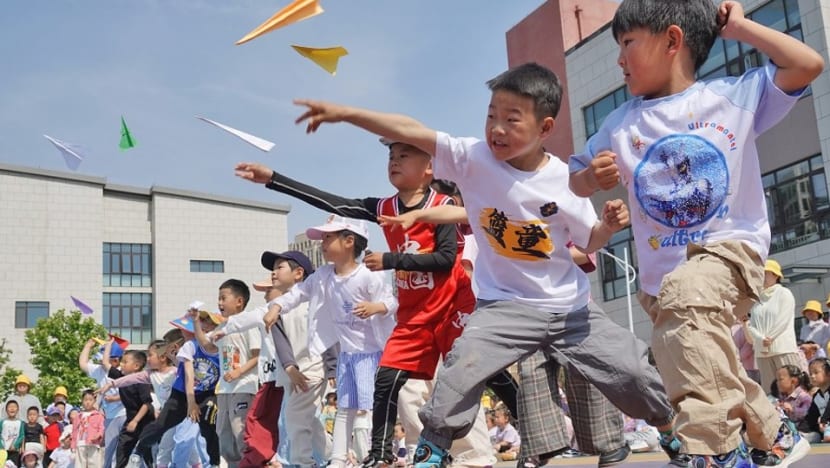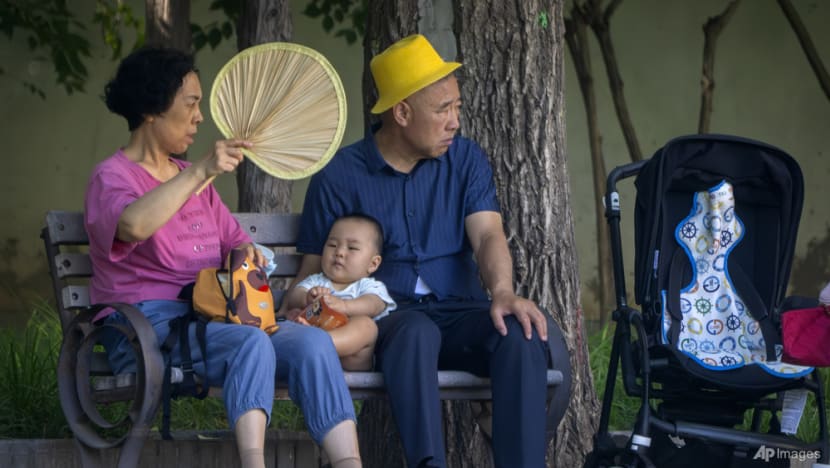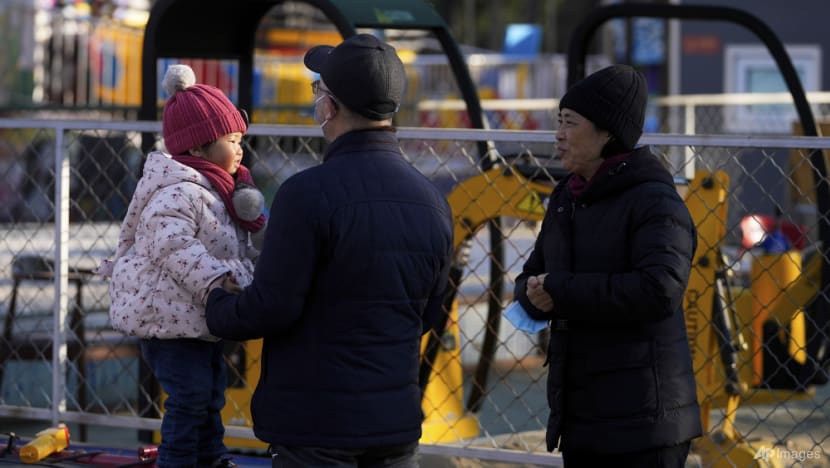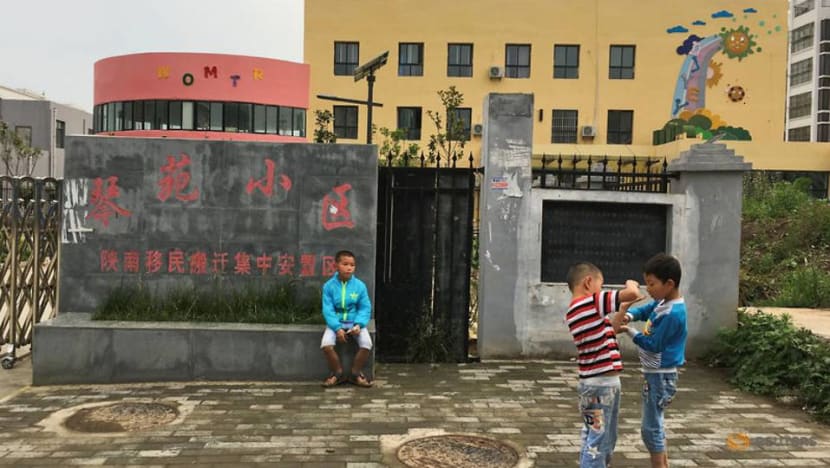Free preschool, baby bonus: China’s early education push seeks to level the playing field
Policymakers hope to ease the load on young families, close early education gaps and nudge birth rates up. But deeper structural pressures and societal expectations may prove harder to shift.

Children fly paper airplanes at the Second Experimental Kindergarten in Yantai High-tech Zone, Shandong province, China, on May 29, 2024. (Photo: Sipa USA via Reuters/CFOTO)

This audio is generated by an AI tool.
SHENZHEN: When Zhao Xiaodou’s baby turned seven months old, the 32-year-old civil servant in Shandong was already scouting out preschool options.
“My colleague asked me to apply to Golden Cradle kindergarten and offered a 1,000 yuan (US$140) voucher, but I still find it too expensive,” she said, referring to the well-known private preschool chain that has over 500 outlets nationwide.
“I’ll go for a public one.”
For many parents like Zhao, preparing early is part of the unspoken race to give their children a head start in life.
But the costs are daunting. Raising a child to age 18 in China now averages 538,000 yuan, up from about 485,000 yuan in 2020, according to studies by the Beijing-based think tank Yuwa Population Research Institute.
To ease the burden, China is ramping up support for young families - from childcare subsidies for toddlers, to a phased rollout of free preschool education starting next month.
New legislation has also been introduced to curb academic pressure, including a ban on public kindergartens teaching primary-level subjects.
Analysts say the latest policies are a step towards a fairer playing field, especially for families in rural and smaller cities.
At the same time, they warn that regional disparities and entrenched social pressures could blunt the impact.
Questions also remain over whether they will be enough to arrest a declining birth rate, part of a broader demographic slide threatening China’s long-term economic and social resilience.
PURSUING PRESCHOOL PARITY
China’s one-child policy and rapid urbanisation have contributed to decades of declining births.
In 2023, the country logged 6.39 births per 1,000 people, the lowest since records began in 1949. The figure saw a slight uptick in 2024, reversing seven straight years of decline, buoyed by post-pandemic recovery and the arrival of an auspicious zodiac year.
In late July, China fired a fresh salvo in its bid to ease the costs of raising children, introducing a 3,600 yuan annual childcare subsidy for children up to the age of three.
Major action was taken just a week later in early August, when officials announced a progressive rollout of free preschool education.
Tuition fees for children in their final year at public kindergartens will be waived starting in September. Private providers are required to lower their fees in line with the waivers.
For example, if a private kindergarten charges 1,000 yuan per month and the local public kindergarten waiver is 400 yuan, the private provider must apply the same deduction, meaning parents only need to pay the remaining 600 yuan.

Officials have said the measures are intended to cut early education costs, strengthen basic public services and offer education that aligns with people’s expectations.
“The move is to put people first, invest in people,” Chinese Vice Finance Minister Guo Tingting said at a State Council briefing on Aug 7, adding that the policy would benefit around 12 million children and reduce household spending by about 20 billion yuan in the autumn semester alone.
The financial burden will be jointly shouldered by the central and local governments, with the former assuming the greater share, Guo said.
The latest moves reflect a gradual shift towards free and universal education, said Zhou Wang, a professor at Nankai University’s Zhou Enlai School of Government in Tianjin.
He noted that as birth rates fall, particularly in major cities, more families from rural areas may move to urban centres to access preschool services that are typically better funded and perceived as offering higher-quality early education.
“Considering the gap between urban and rural areas in education and public services, this could help children in their growth,” Zhou told CNA.
But Alfred Wu, an associate professor at Singapore’s Lee Kuan Yew School of Public Policy (LKYSPP), cautioned that better preschool access “might only slightly level the playing field”, as rural parents still face a knowledge gap and lack of networks compared with their urban counterparts.
“In the countryside, many families simply don’t know what opportunities exist - they miss out, not just because of money but because of an information gap,” he told CNA.
Ren Yuan, a professor at Fudan University’s School of Social Development and Public Policy, said that preschool spending is closely tied to household income.
“By helping children access care and education services before school age, the policy can support different social groups - especially disadvantaged families - to have a fairer starting point in education,” he told CNA.
DECISIONS AND DIFFICULTIES
For some parents, the fresh support is already reshaping preschool decisions.
Zhang Shuyan, 31, a piano teacher and mother of a 16-month-old in Shenzhen, said she is now considering private options for her child.
“With more subsidies, it makes things easier, and I can choose something better,” she told CNA.
But experts warn that the effectiveness of the 3,600 yuan annual childcare subsidies will be uneven and vary widely across regions due to differences in local costs.
“In provinces like Shandong or Henan, this amount is decent and will be effective … but in cities such as Shanghai, it means almost nothing because housing and other costs are so high,” Su Yue, principal economist at the Economist Intelligence Unit (EIU), told CNA.
While the subsidies target toddlers under the age of three, they highlight broader concerns about early childhood affordability, especially given how widely kindergarten fees vary across the country and even within specific regions.
For instance, in Shanghai, fees at public kindergartens for children in their final year start at 125 yuan a month, rising to about 700 yuan at so-called demonstration kindergartens, regarded as model institutions with higher standards of teaching and facilities.
In Shenyang, the provincial capital of Liaoning, monthly fees at public full-day kindergartens range from 190 yuan per child in rural one-star schools to 950 yuan in top-rated urban ones.
Subsidies can only ease costs at the margins, Su further noted.
She cited Tianshui city in Gansu province, where generous local support briefly lifted births, but said such outcomes are short-lived.
And even as steps are taken to improve affordability, access remains a major hurdle - particularly for migrant families in big cities, where public kindergarten enrolment is often restricted by local residency rules.
That’s the challenge facing Chen Yunshu, 31, a mother from Jiangxi who is now teaching and raising her one-year-old in Shenzhen.
“If you don’t have local hukou, it’s difficult to get a public kindergarten place because the slots are so limited,” she told CNA.
China’s hukou, or household registration system, was formalised in 1958 to link access to jobs, housing and welfare to one’s place of birth, a mechanism that historically restricted rural to urban migration.
While regulations have eased in smaller cities, major hubs like Beijing, Shanghai and Shenzhen still prioritise local residents, making it harder for migrant families to secure places in public kindergartens.
Many have little choice but to turn to private providers instead. While fees at private kindergartens will be lowered under the latest policy changes, they remain higher than public options, especially as these outlets can still charge separately for meals, extended care and enrichment classes.
MORE PLAY, LESS PRESSURE
While affordability and access remain key concerns, China is also moving to ease academic pressure in early childhood.
On Jun 1, its new Preschool Education Law came into effect, banning public kindergartens from teaching primary-level subjects such as maths or English. The aim is to shield children from premature academic stress and preserve a play-based approach to early learning.
Experts say such measures may help ease parental anxiety while discouraging premature academic competition.
“Primary school-style teaching was already a violation of education science,” Tang Dajie, a senior researcher with China Enterprise Institute, a think tank in Beijing, told CNA.
But the move has divided parents, sparking debate on social media and highlighting the competing pressures between giving children an academic head start and easing stress during their formative years.

Some continue to push for extra lessons, fearing their children will fall behind. Others welcome the reprieve from what many call “early involution” - a term borrowed from China’s corporate culture to describe the intense, often self-defeating competition that policymakers increasingly view with concern.
In this context, it refers to the race to gain an early edge even before formal schooling begins.
“One of the reasons people don’t want to give birth is the involution. It hurts parents,” said EIU’s Su.
Ou, a high school teacher in Guangzhou who only wanted to be identified by her surname, has watched the difference play out in her own family. One niece attended a private kindergarten packed with enrichment classes.
“But in the end, she wasn’t really interested - it was just time wasted,” she told CNA. Another younger niece is now in a public kindergarten.
“We just let her play happily. When I was young, I never went to kindergarten, and primary school was still fine,” Ou remarked.
“Kindergarten should be for play.”
While the new legislation might help curb excessive academic demands in early childhood, analysts warn that the pressure to compete early will not disappear overnight.
“Parents will continue to force their child to study harder and take extracurricular classes, because this is a social norm,” said Su from EIU.
“But once they realise the overall number of children is smaller than their own generation, they will feel more relaxed.”
Zhou from Nankai University said putting children’s rights first could support fertility goals and improve mental health across society.
“It makes adults more tolerant and eases social tensions,” he said.

SHRINKING COHORT, SHIFTING SECTOR
Even as such efforts take root, China’s shrinking birthrate is already reshaping the preschool landscape - not just for parents, but also for operators and educators.
What was once a scramble for places has, in some areas, turned into a scramble for pupils, with fewer enrolments forcing some kindergartens to merge, downsize or shut altogether.
The country had over 20,000 fewer kindergartens in 2024 than the year before, with enrolments falling by more than 5 million to 35.8 million, according to Education Ministry data.
For Jingjing, who has taught preschool in Nanjing for 18 years and only wanted to be identified by her given name, the end came abruptly this summer.
She was told her dismissal was due to a shifting landscape and a last-in-first-out policy, where the most recently hired employees are the first to be let go.
“The kindergarten still operates as usual, but enrolment hasn’t been full,” she said. Three of her colleagues were also dismissed.
Her experience points to a wider trend emerging across parts of the country, as shrinking cohorts of young children pressure preschool operators.
In central China, some private operators have shut schools due to a lack of students. One investor told local news platform Red Star News that two kindergartens she opened during the short-lived two-child boom - the immediate years following the relaxation of the one-child policy in 2016 - are now either closed or running at a loss, with teachers redeployed to public schools.
Public kindergartens, by contrast, have proved more resilient. After a “public-first” policy drive in 2020, most regions now operate on a state-led model, with private providers playing a supporting role.
Experts say the latest childcare subsidies and kindergarten fee waivers may help cushion the blow on preschools by lowering household costs and propping up enrolments.
“Free preschool education for children in their final year of kindergarten is a form of human capital investment. It eases the financial burden on families and helps children gain access to care and education earlier,” said Ren from Fudan University.
At the same time, he noted that preschool is not part of China’s nine-year compulsory education system, which begins at primary school and continues through junior secondary school.
“Government spending on it remains relatively low, especially compared with OECD countries,” he added, referring to the Organisation for Economic Co-operation and Development, a group of mostly developed economies that includes the United States, Japan and South Korea.
But exactly how far will China’s latest push to ease the pinch of early education go in narrowing long-standing disparities and boosting families’ confidence in raising children amid economic and social pressures?
Tang from China Enterprise Institute believes the overall effect will be limited.
“Social mobility, whether across regions or social classes, is shaped by many complex factors,” he said.
“The most decisive ones are higher education and economic development. The impact of other measures will not be particularly significant.”
But demographic pressures are unlikely to ease soon. While latest efforts target childcare costs and access, experts say the underlying challenge runs deeper - shaped by a rapidly ageing society, economic turbulence and growing pessimism among younger generations.
Analysts pointed to structural forces such as the high cost of urban living, job insecurity and shifting values around marriage and parenthood.
Zhou Yun, an assistant professor of sociology and Chinese studies at the University of Michigan, told CNA that kindergarten fees are only a small part of the web of financial and time commitments Chinese parents must navigate.
She said norms of “good parenting” in China have become tied to heavy investments in children’s education from a very early age, meaning policies like fee waivers alone “hardly move the needle” on childbearing intentions.
EIU’s Su said fertility is influenced by multiple factors - from competition in education and income stability to the broader economic climate and the reliability of social welfare support.
Still, she described the latest free preschool policy as a “very good experiment” - one that allows policymakers to gauge how families respond without incurring major fiscal costs, and could pave the way for broader support down the line.
Authorities have already signalled room for expansion.
At the Aug 7 State Council press briefing, Guo said the government would review the policy’s rollout and study “appropriate improvements”, including the possibility of extending coverage beyond the final kindergarten year.
But for Zhao, the civil servant in Shandong, the new measures - and possibly more down the road - haven’t changed her mind: she still has no plans for a second child.
Her decision to have one at all, she said, was driven more by social and family pressures than by financial incentives.
“My husband and I are both only children, and I think being an only child is actually quite good,” she said.
“With one child, the whole family’s attention is focused on them. With two, there will inevitably be favouritism and unfair treatment,” Zhaos said.
“I don’t want to be tied down by children. I also need freedom.”



















